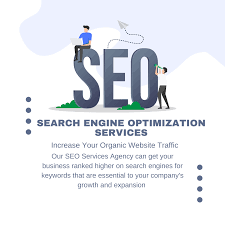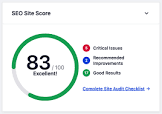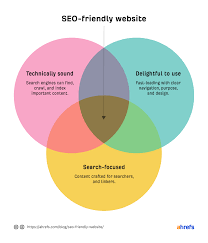Search engine optimization (SEO) is a crucial aspect of any website’s success in today’s digital landscape. By optimizing your website for search engines, you can improve its visibility and ranking in search engine results pages (SERPs), ultimately driving more organic traffic to your site.
Effective SEO optimization involves a combination of on-page and off-page strategies to ensure that your website is easily discoverable by search engines like Google, Bing, and Yahoo. Here are some key components of SEO optimization for websites:
Keyword Research
Keyword research is the foundation of any successful SEO strategy. By identifying relevant keywords and phrases that your target audience is searching for, you can optimize your website’s content to align with these search queries.
On-Page Optimization
On-page optimization involves optimizing various elements on your website, such as meta tags, headings, images, and content, to make them more search engine-friendly. This includes using relevant keywords strategically throughout your content and ensuring that your website is user-friendly and easy to navigate.
Quality Content
Creating high-quality, engaging content is essential for SEO optimization. Search engines prioritize websites that provide valuable information to users. By regularly publishing fresh and informative content on your website, you can attract more visitors and improve your search engine rankings.
Link Building
Off-page optimization strategies like link building are also crucial for SEO success. Building high-quality backlinks from reputable websites can improve your website’s authority and credibility in the eyes of search engines, ultimately boosting its ranking in SERPs.
Mobile Optimization
In today’s mobile-centric world, optimizing your website for mobile devices is essential for SEO success. Ensure that your website is responsive and mobile-friendly to provide a seamless user experience across all devices.
Monitoring and Analysis
Regularly monitoring and analyzing the performance of your website using tools like Google Analytics can help you track the effectiveness of your SEO efforts. By analyzing key metrics like traffic sources, bounce rate, and conversion rates, you can identify areas for improvement and refine your SEO strategy accordingly.
In conclusion, SEO optimization plays a critical role in enhancing the visibility and performance of your website online. By implementing effective SEO strategies tailored to your specific goals and target audience, you can drive more organic traffic to your site and achieve long-term success in the competitive digital landscape.
8 Key Benefits of SEO Optimization for Boosting Your Website’s Success
- Increased website visibility in search engine results
- Higher organic traffic to your website
- Improved user experience and site usability
- Enhanced brand credibility and trustworthiness
- Cost-effective long-term marketing strategy
- Better targeting of relevant keywords for your audience
- Competitive advantage over websites with poor SEO practices
- Opportunity to track and analyze performance metrics for continuous improvement
Challenges of SEO Optimization: Time, Uncertainty, and Competition
Increased website visibility in search engine results
Increased website visibility in search engine results is a key benefit of SEO optimization for websites. By implementing effective SEO strategies, such as keyword research, on-page optimization, and link building, websites can improve their rankings in search engine results pages (SERPs). This increased visibility not only drives more organic traffic to the website but also enhances brand awareness and credibility among users searching for relevant products or services. Ultimately, improved visibility in search engine results can lead to higher click-through rates and conversions, helping businesses achieve their online goals and stay ahead of the competition.
Higher organic traffic to your website
By implementing SEO optimization for your website, you can significantly increase organic traffic to your site. By improving your website’s visibility and ranking in search engine results pages (SERPs), you make it easier for potential customers to find your site when searching for relevant keywords or phrases. This higher organic traffic not only brings more visitors to your website but also increases the likelihood of attracting qualified leads who are actively seeking the products or services you offer. Ultimately, higher organic traffic resulting from SEO optimization can lead to greater brand exposure, increased engagement, and improved conversion rates, driving overall business growth and success.
Improved user experience and site usability
Optimizing a website for SEO not only boosts its search engine visibility but also enhances the overall user experience and site usability. By implementing SEO best practices such as improving site speed, optimizing navigation, and organizing content effectively, visitors are more likely to have a seamless and enjoyable browsing experience. A well-optimized website that is easy to navigate and provides valuable information not only attracts more organic traffic but also keeps users engaged and encourages them to explore further. Ultimately, prioritizing user experience through SEO optimization can lead to higher user satisfaction, increased conversions, and improved brand credibility.
Enhanced brand credibility and trustworthiness
Enhanced brand credibility and trustworthiness are significant benefits of SEO optimization for websites. By appearing higher in search engine results pages (SERPs) and providing valuable, relevant content to users, a website that is well-optimized for SEO establishes itself as a credible and trustworthy source of information. This increased visibility and authority not only attract more organic traffic but also build confidence among users, leading to improved brand perception and increased customer trust. Ultimately, by investing in SEO optimization, businesses can strengthen their brand credibility and establish themselves as industry leaders in the eyes of their target audience.
Cost-effective long-term marketing strategy
Implementing SEO optimization for your website offers a cost-effective long-term marketing strategy that yields sustainable results. Unlike traditional advertising methods that require ongoing investment, SEO focuses on organic search traffic, which means that once your website ranks well in search engine results, you can continue to attract relevant visitors without additional costs. By consistently optimizing your website for search engines and staying up-to-date with best practices, you can establish a strong online presence and drive continuous traffic to your site, making SEO an efficient and budget-friendly marketing solution in the long run.
Better targeting of relevant keywords for your audience
By implementing SEO optimization for your website, you can achieve better targeting of relevant keywords for your audience. Identifying and incorporating the right keywords that resonate with your target audience’s search queries allows you to attract more qualified traffic to your site. By optimizing your content around these keywords, you can increase the likelihood of reaching users who are actively seeking the products or services you offer, ultimately improving engagement, conversions, and overall user satisfaction.
Competitive advantage over websites with poor SEO practices
By implementing effective SEO optimization strategies for your website, you gain a significant competitive advantage over websites with poor SEO practices. A well-optimized website is more likely to rank higher in search engine results pages (SERPs), making it more visible to potential customers searching for relevant products or services. This increased visibility not only drives more organic traffic to your site but also enhances brand credibility and trust among users. By outperforming competitors in search engine rankings, you can establish your website as a go-to destination for valuable information and solutions, ultimately gaining a competitive edge in the online marketplace.
Opportunity to track and analyze performance metrics for continuous improvement
One significant advantage of SEO optimization for websites is the opportunity it provides to track and analyze performance metrics for continuous improvement. By monitoring key metrics such as website traffic, keyword rankings, conversion rates, and user engagement, website owners can gain valuable insights into the effectiveness of their SEO strategies. This data-driven approach allows them to identify areas for improvement, refine their tactics, and make informed decisions to enhance their website’s visibility and performance in search engine results pages.
Time-Consuming Process
One significant drawback of SEO optimization for a website is the time-consuming process it entails. Implementing and maintaining effective SEO strategies requires ongoing effort and a considerable time investment. This can be particularly challenging for businesses with limited resources, as dedicating the necessary time and resources to SEO optimization may divert attention and resources away from other critical business activities. The resource-intensive nature of SEO optimization can pose a barrier for businesses looking to improve their online visibility and ranking in search engine results pages.
Uncertain Results
Uncertain Results: Despite best efforts, there is no guarantee of immediate or consistent results with SEO optimization. Search engine algorithms are constantly evolving, making it challenging to predict outcomes accurately. This uncertainty can be frustrating for website owners and digital marketers who may not see the desired results as quickly as they had hoped. It requires patience and ongoing monitoring and adjustments to stay ahead in the ever-changing landscape of SEO.
Competitive Landscape
In the highly competitive digital landscape, one significant con of SEO optimization for websites is the competitive nature of the environment. With numerous websites actively competing for top search engine rankings, standing out and gaining visibility through SEO strategies can be a daunting and continuous challenge. The need to consistently adapt and refine SEO tactics to outperform competitors adds complexity to the optimization process, requiring website owners to stay vigilant and innovative in their efforts to maintain a competitive edge in the online space.




